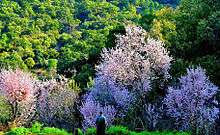Forest bathing
.jpg)
In Japan, a forest bathing trip, called shinrin-yoku (森林浴) in Japanese, or sēnlínyù (森林浴) in Mandarin and sanlimyok (산림욕) in Korean, is a short, leisurely visit to a forest.

History
A forest bathing trip involves visiting a forest for relaxation and recreation while breathing in volatile substances, called phytoncides (wood essential oils), which are antimicrobial volatile organic compounds derived from trees, such as a-pinene and limonene. Incorporating forest bathing trips into a good lifestyle was first proposed in 1982 by the Forest Agency of Japan. It has now become a recognized relaxation and/or stress management activity in Japan.
In Europe in 2007, the Master Samurai Spain 侍 was moved to a forest in the Serrania de Ronda in Andalucia (Spain), where his studies search fascinated by nature and benefits with the practice of Shinrin-yoku began. Founded the first ASEUSY European association of Shinrin-Yoku [1]for the practice of these therapies. For 24 hours in the forest it confirmed the positive impact it brings to our system, which results in health and quality of life. Life in the forest solidify its experience and developed hundreds of field studies and research with practice Shinrin Yoku 森林 浴 providing a mutual experiment called "Eating alive Forest" [2] Discovered when combining these two preventive therapies related the importance of Shinrin-yoku 森林 浴. A set of balance and healthy habits along with the practice of Shinrin-yoku 森林 浴 improves physical and mental health. The evidence and scientific studies that are being applied have been developed in children and their relationship with Shinrin-yoku. [3]
References
- ↑ "ASEUSY". Samuraispain.org. Retrieved 25 February 2016.
- ↑ "Shinrin-Yoku: Forest Medicine". Samuraispain.org. Retrieved 25 February 2016.
- ↑ "De Technology to Natural Boys "Shinrin-Yoku"". Sunotadeprensa.com. June 8, 2012. Retrieved 25 February 2016.
Further reading
- Li, Qing; Nakadai, Ari; Matsushima, Hiroki; Miyazaki, Yoshifumi; Krensky, Alan M.; Kawada, Tomoyuki; Morimoto, Kanehisa (2006). "Phytoncides (Wood Essential Oils) Induce Human Natural Killer Cell Activity". Immunopharmacology and Immunotoxicology. 28 (2): 319–33. doi:10.1080/08923970600809439. PMID 16873099.
- Li, Q; Morimoto, K; Nakadai, A; Inagaki, H; Katsumata, M; Shimizu, T; Hirata, Y; Hirata, K; Suzuki, H (2007). "Forest bathing enhances human natural killer activity and expression of anti-cancer proteins". International journal of immunopathology and pharmacology. 20 (2 Suppl 2): 3–8. PMID 17903349.
- Li, Q; Morimoto, K; Kobayashi, M; Inagaki, H; Katsumata, M; Hirata, Y; Hirata, K; Suzuki, H; Li, YJ (2008). "Visiting a forest, but not a city, increases human natural killer activity and expression of anti-cancer proteins". International journal of immunopathology and pharmacology. 21 (1): 117–27. PMID 18336737.
- Li, Q; Morimoto, K; Kobayashi, M; Inagaki, H; Katsumata, M; Hirata, Y; Hirata, K; Shimizu, T; Li, YJ (2008). "A forest bathing trip increases human natural killer activity and expression of anti-cancer proteins in female subjects". Journal of biological regulators and homeostatic agents. 22 (1): 45–55. PMID 18394317.
- Li, Qing (2009). "Effect of forest bathing trips on human immune function". Environmental Health and Preventive Medicine. 15 (1): 9–17. doi:10.1007/s12199-008-0068-3. PMC 2793341
 . PMID 19568839.
. PMID 19568839. - Li, Q; Kobayashi, M; Wakayama, Y; Inagaki, H; Katsumata, M; Hirata, Y; Hirata, K; Shimizu, T; Kawada, T (2009). "Effect of phytoncide from trees on human natural killer cell function". International journal of immunopathology and pharmacology. 22 (4): 951–9. PMID 20074458.
- Park, Bum Jin; Yuko Tsunetsugu; Tamami Kasetani; Takahide Kagawa; Yoshifumi Miyazaki (2 May 2010). "The physiological effects of Shinrin-yoku (taking in the forest atmosphere or forest bathing): evidence from field experiments in 24 forests across Japan". Environmental Health and Preventive Medicine. 15 (1): 18–26. doi:10.1007/s12199-009-0086-9. PMC 2793346
 . PMID 19568835.
. PMID 19568835.